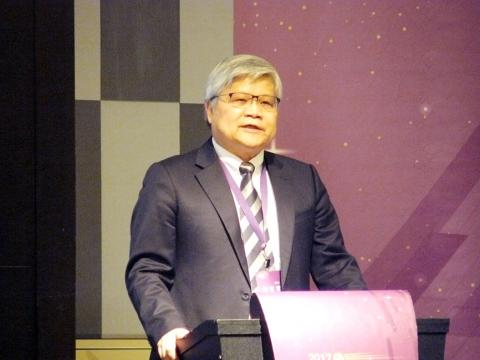Taiwan’s semiconductor industry is bracing for escalating global competition amid rising protectionism and the ascension of China, Taiwan Semiconductor Industry Association (TSIA, 台灣半導體協會) director-general C.C. Wei (魏哲家) said yesterday.
Wei made the remarks during his opening speech at the annual TSIA meeting in Hsinchu.
Wei also serves as cochief executive officer of Taiwan Semiconductor Manufacturing Co (TSMC, 台積電) and is to become the sole chief executive of the chip supplier to Apple Inc in June next year in the company’s latest succession plan.

Photo: CNA
TSIA members are being presented with enormous business opportunities primarily from the nascent adoption of artificial intelligence, which is expected to be widely applied to virtual reality and augmented reality devices, the Internet of Things and self-driving cars, Wei said.
At the same time, local semiconductor companies are facing challenges, he said.
“It is a challenge for Taiwan’s semiconductor industry [to fend off competition from China] as the Chinese government is endeavoring to foster its semiconductor industry,” Wei said. “It is undeniable that China has risen to be the world’s biggest semiconductor market, with more than a 30 percent share.”
Chinese central and local governments fully support its semiconductor companies to enhance their competitiveness and reduce the nation’s dependence on chip imports. China has an ultimate goal of bringing the nation to the center of the worldwide semiconductor industry by 2025.
To address the issue, Taiwanese semiconductor companies should carve out their own technological capabilities, Wei said.
China said it would boost homemade chip supply in the nation to 40 percent by 2020 and to 60 percent by 2025, which is placing greater pressure on the nation’s export-oriented semiconductor firms, chip tester and packager Powertech Technology Inc (力成科技) general manager Hung Chia-yu said.
“Taiwanese chip testers and packagers should consolidate and work together to combat growing competition from Chinese rivals,” Hung said.
Powertech’s combination with Greatek Electronics Inc (超豐電子) has set an example, he added.
Local companies should focus on differentiating themselves from their Chinese peers in terms of their products and technology, he said.
It is also important to better manage customer relations and cultivate talent, he said.
TSIA would continue to act as a bridge between the local semiconductor industry and government agencies to help the government implement practical and beneficial policies for the industry, Wei said.
Stable supply of land, water, electricity and talent are top of the agenda at the discussions, Wei said.

MORE VISITORS: The Tourism Administration said that it is seeing positive prospects in its efforts to expand the tourism market in North America and Europe Taiwan has been ranked as the cheapest place in the world to travel to this year, based on a list recommended by NerdWallet. The San Francisco-based personal finance company said that Taiwan topped the list of 16 nations it chose for budget travelers because US tourists do not need visas and travelers can easily have a good meal for less than US$10. A bus ride in Taipei costs just under US$0.50, while subway rides start at US$0.60, the firm said, adding that public transportation in Taiwan is easy to navigate. The firm also called Taiwan a “food lover’s paradise,” citing inexpensive breakfast stalls

TRADE: A mandatory declaration of origin for manufactured goods bound for the US is to take effect on May 7 to block China from exploiting Taiwan’s trade channels All products manufactured in Taiwan and exported to the US must include a signed declaration of origin starting on May 7, the Bureau of Foreign Trade announced yesterday. US President Donald Trump on April 2 imposed a 32 percent tariff on imports from Taiwan, but one week later announced a 90-day pause on its implementation. However, a universal 10 percent tariff was immediately applied to most imports from around the world. On April 12, the Trump administration further exempted computers, smartphones and semiconductors from the new tariffs. In response, President William Lai’s (賴清德) administration has introduced a series of countermeasures to support affected

CROSS-STRAIT: The vast majority of Taiwanese support maintaining the ‘status quo,’ while concern is rising about Beijing’s influence operations More than eight out of 10 Taiwanese reject Beijing’s “one country, two systems” framework for cross-strait relations, according to a survey released by the Mainland Affairs Council (MAC) on Thursday. The MAC’s latest quarterly survey found that 84.4 percent of respondents opposed Beijing’s “one country, two systems” formula for handling cross-strait relations — a figure consistent with past polling. Over the past three years, opposition to the framework has remained high, ranging from a low of 83.6 percent in April 2023 to a peak of 89.6 percent in April last year. In the most recent poll, 82.5 percent also rejected China’s

PLUGGING HOLES: The amendments would bring the legislation in line with systems found in other countries such as Japan and the US, Legislator Chen Kuan-ting said Democratic Progressive Party (DPP) Legislator Chen Kuan-ting (陳冠廷) has proposed amending national security legislation amid a spate of espionage cases. Potential gaps in security vetting procedures for personnel with access to sensitive information prompted him to propose the amendments, which would introduce changes to Article 14 of the Classified National Security Information Protection Act (國家機密保護法), Chen said yesterday. The proposal, which aims to enhance interagency vetting procedures and reduce the risk of classified information leaks, would establish a comprehensive security clearance system in Taiwan, he said. The amendment would require character and loyalty checks for civil servants and intelligence personnel prior to